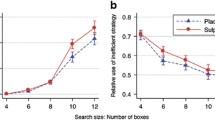Abstract
Twenty healthy young adults completed a series of nonverbal and problem solving tasks in a repeated measures design involving placebo and 0.6 mg scopolamine, administered by subcutaneous injection. Subjects completed the test battery under standard presentation conditions and with concurrent articulation, which precludes verbal recoding of test material. Under standard presentation conditions, scopolamine significantly impaired performance on the problem solving task and on tasks of visuo-spatial and spatial memory; memory for abstract shapes was not impaired. Concurrent articulation impaired performance on the shape recognition and interacted with drug treatment on the problem solving task. The results suggest that scopolamine impairs working memory, and that the decrement is at the level of the central executive mechanism rather than the subsystems which it controls.
Similar content being viewed by others
References
Baddeley AD (1968) A three minute reasoning test based on grammatical transformation. Psychonom Sci 10:341–342
Baddeley AD (1986) Working memory. Clarendon Press, Oxford
Baddeley AD, Hitch GJ (1974) Working memory. In: Bower G (ed) Recent advances in learning and motivation 8. Academic Press, New York, pp 47–90
Baddeley AD, Logie R, Bressi S, Della Sala S, Spinnler H (1986) Dementia and working memory. Q J Exp Psychol 38A:603–618
Burke DM, Light LL (1981) Memory and aging: the role of retrieval processes. Psychol Bull 90:513–546
Caine ED, Weingartner H, Ludlow CL, Cudahy EA, Wehry S (1981) Qualitative analysis of scopolamine-induced amnesia. Psychopharmacology 74:74–80
Crow TJ, Grove-White IG, Ross DG (1975) The specificity of the action of hyoscine on human learning. Br J Clin Pharmacol 2:367–368
Drachman DA, Leavitt J (1974) Human memory and the cholinergic system. Arch Neurol 30:113–121
Drachman DA, Noffsinger D, Sahakian BJ, Kurdziel S, Fleming P (1980) Aging, memory and the cholinergic system: a study of dichotic listening. Neurobiol Aging 1:39–43
Dunne MP, Hartley LR (1985) The effects of scopolamine upon verbal memory: evidence for an attentional hypothesis. Acta Psychol 58:205–217
Frith CD, Richardson JTE, Samuel M, Crow TJ, McKenna PJ (1984) The effects of intravenous diazepam and hyposcine upon human memory. Q J Exp Psychol 36A:133–144
Ghonheim MM, Mewaldt SP (1975) Effects of diazepam and scopolamine on storage, retrieval, and organizational processes in memory. Psychopharmacologia 44:257–262
Ghonheim MM, Mewaldt SP (1977) Studies on human memory: the interactions of diazepam, scopolamine, and physostigmine. Psychopharmacology 52:1–6
Kirk RE (1982) Experimental design: procedures for the behavioural sciences, 2nd Edn. Brooks/Cole, Belmont, California
Kopelman MD (1986) The cholinergic neurotransmitter system in human memory and dementia: a review. Q J Exp Psychol 38A:535–573
Kopelman MD (1987) How far could cholinergic depletion account for the memory deficits of Alzheimer-type dementia or the alcoholic Korsakoff syndrome? In: Stahl S, Iversen S, Goodman (eds) Cognitive neurochemistry. University Press, Oxford, pp 303–326
Mewaldt SP, Ghonheim MM (1979) The effects and interactions of scopolamine, physostigmine, and methamphetamine on human memory. Pharmacol Biochem Behav 10:205–210
Mohns RC, Davis KL (1985) Interaction of choline and scopolamine in human memory. Life Sci 37:193–197
Morris RG (1984) Dementia and the functioning of the Articulatory Loop System. Cog Neuropsychol 1:143–157
Morris RG (1986) Short-term forgetting in senile dementia of the Alzheimer's type. Cogn Neuropsychol 3:77–97
Morris RG, Evenden JL, Sahakian BJ, Robbins TW (1987) Computer aided assessment of dementia: comparative studies of neuropsychological deficits in Alzheimer-type dementia and Parkinson's disease. In: Stahl SM, Iversen SD, Goodman EC (eds) Cognitive neurochemistry. University Press, Oxford, pp 21–36
Peterson RC (1977) Scopolamine-induced learning failures in man. Psychopharmacologia 52:283–289
Sahakian BJ (1987) Cholinergic drugs and human cognitive performance. In: Iversen L, Iversen SD, Snyder SH (eds) Handbook of psychopharmacology, vol 20. Plenum Press, New York, pp 393–424
Sahakian BJ, Morris RG, Evenden JL, Heald A, Levy R, Philpot M, Robbins TW (1987) A comparative study of visuo-spatial memory and learning in Alzheimer-type dementia and Parkinson's disease. Brain (in press)
Salame P, Baddeley AD (1982) Disruption of short-term memory by unatteneded speech; implications for the structure of working memory. J Verb Learn Verb Behav 21:150–164
Author information
Authors and Affiliations
Rights and permissions
About this article
Cite this article
Rusted, J.M., Warburton, D.M. The effects of scopolamine on working memory in healthy young volunteers. Psychopharmacology 96, 145–152 (1988). https://doi.org/10.1007/BF00177553
Received:
Revised:
Issue Date:
DOI: https://doi.org/10.1007/BF00177553




